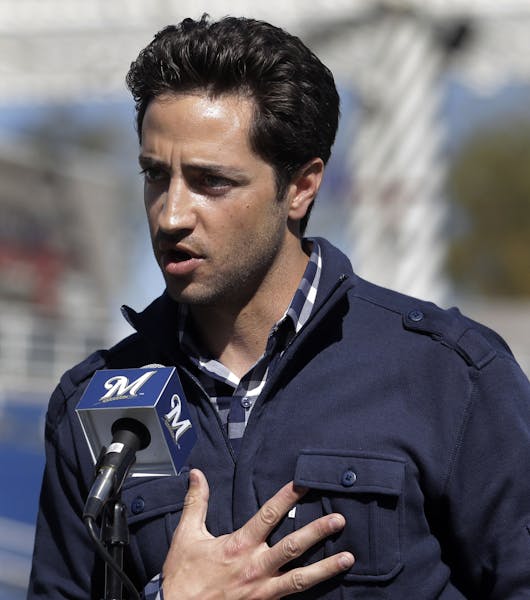I know, I know, you despise Ryan Braun. And you should.
He cheated, which Americans often forgive, but then he lied about it, which narrows his prospects for popularity. And while he lied, he looked us in the collective eye and threw an innocent man under the particular bus that tramples the innocent, so Braun is hereby sentenced to the complex of virtual solitary confinement cells that hold Lance Armstrong, Barry Bonds and the portion of Alex Rodriguez's brain that once formed coherent thoughts.
You hate Ryan Braun, which is justified, even convenient, because he plays for a rival team in Minnesota's rival state, but the hatred of fans and writers and even his peers obscures what's important.
It's not the crime. It's the punishment.
Think of Braun the way you think of other white-collar criminals, like the crooks on Wall Street. You can't erase their riches, can't keep them from wiping the guilt sweat from their brows with thousand-dollar bills. The best that the powers-that-be can do is damage their reputations and use their stories to stump for harsher punishments for the next generation of cheaters.
Baseball is doing that, or at least trying, and that's the real story here. There will always be cheaters in sports, just as there will always be cheaters and frauds on Wall Street and in Congress. Baseball is doing more to pursue and punish its drug cheats than our government did to punish the banks and financiers that destroyed our economy, and doing so at great risk to its own product.
Baseball is a business that relies on ratings, attendance and the health of its franchises. Punishing Braun, and exposing him as a user of performance-enhancing drugs, damages ratings, attendance and the health of the franchise baseball's commissioner once owned.
What other major North American sport has so eagerly flogged itself, to its own detriment?
It's true that Braun's punishment seems light. He's being suspended without pay for 65 games, the remainder of a season in which his team is not contending. He will return next year, with full pay, knowing that if he doesn't test positive for performance-enhancing drugs again he will make another $120 million or so the rest of his career. He, like the Wall Street fat cats, will assuage his guilt with the trappings of continued wealth.
The punishment may seem ineffectual, but this is a case of process, and due process. Braun is not the final test of baseball's drug enforcement. He is the test case, and maybe the tipping point. Braun's punishment is not a culmination; it is the new baseline.
When Mark McGwire and Sammy Sosa were exposed as frauds, the rank-and-file baseball player fell in line with the stance of their Players Association, which fought against increased testing for PEDs. Now the rank-and-file player wants the game cleaned up, wants Braun punished to the full extent of the rules, wants the Players Association to protect players' rights to due process but also wants the cheaters to be caught.
Braun's confession means the other players on the list who have had dealings with Biogenesis or Anthony Bosch will have trouble damaging Bosch's credibility. Braun's confession means that the Biogenesis case will bring down a handful of prominent baseball players, and will set a precedent for levying harsh penalties.
The landscape of baseball has changed. Marvin Miller and Donald Fehr aren't running the Players Association any more. Michael Weiner is the executive director. He is also suffering from a brain tumor. Former player Tony Clark has become Weiner's deputy and presumed successor.
The new leadership of the Players Association is still interested in protecting its members' rights to due process, but it is no longer trying to shield the guilty. This is the perfect time for baseball to push for harsher punishments, perhaps a one-year ban when a player tests positive for PEDs the first time, and a lifetime ban for a second offense. And that's what is on the horizon.
Once the anger over Braun's behavior fades, he'll become less a symbol of despicable behavior than a symbol of baseball's willingness to police itself at great risk to its own product. Braun has unwittingly helped baseball start winning its war on drugs.
Jim Souhan can be heard Sundays from 10 a.m.-noon on AM-1500 KSTP. jsouhan@startribune.com

Souhan: Why Tiger Woods should keep swinging
Souhan: Scheffler wins Masters again, shows what makes him special
Morikawa falters in final round at Masters

Keeping up with the Joneses who helped design Augusta National's classic back nine


